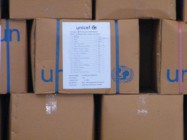English version below
Le 2 mai 2008 s’abattait sur le delta de l’Irrawaddy le cyclone Nargis. Des villages entiers disparurent, sans que l’on en connaisse le nombre d’habitants. La région fut bouclée et interdite d’accès, même aux Birmans ; l’aide internationale attendait en mer alors que la junte affirmait gérer la situation
Les ONG parlent de 150 000 morts. Huit jours après la catastrophe, le référendum pour l’approbation du projet de constitution avait lieu, une semaine plus tard dans la région du delta.
Après le cyclone, on ami me raconta
« Le delta, je connais bien : j’y suis né ! La vie, même en temps normal y est dure, les gens y survivent ! Aucune route ne mène à la plupart des villages ; il faut attendre la marée, sauter dans un bateau pour aller d’un endroit à l’autre. C’est humide toute l’année.
Le soir où le cyclone Nargis s’est déchainé, à Rangoon, les arbres ont commencé à tomber, les tôles à voler. Sur notre maison, un arbre est tombé sans que les dommages ne soient très importants. Mais dans la nuit, vers 4 heures, le vent a tourné et s’est renforcé, et au réveil, nous avons découvert les dégâts dans le centre-ville. Ma famille est originaire du delta ; ma mère y avait rejoint ma sœur dans la maison familiale. Mon fils y est parti le lendemain. Il en est revenu nous décrivant l’importance des dégâts, le désarroi des gens : Maung Soe, un jeune de 17 ans, costaud, avait été emporté par une vague, agrippé pendant plusieurs heures il était parvenu à traverser le bras du fleuve à la nage. Recueilli par les villageois, il est tombé malade. Sans secours ni médicament disponible, il est mort d’une pneumonie. »
Ma Lé,25 ans ; ses 4 enfants sont tous disparus ce jour-là. Depuis, elle les attend. Lorsque l’école a ré-ouvert, elle est allée voir l’instituteur pour excuser leur retard…. et tous les autres…
Mon ami et ses fils sont allés 2 fois par semaine porter nourriture et eau potable dans leur village. Pendant près de deux semaines, la région a été bouclée et interdite d’accès à tous, l’aide internationale refusée, le gouvernement s’estimant seul capable de gérer la situation.
L’aide fut finalement distribuée avec l’aide de l’ASEAN. Les autorisations d’accès dans la région, délivrées au compte-goutte. Il n’existait aucune liste de ces villages provisoires nés du regroupement de familles venues récolter le sel. Certains n’avaient pas de papier. Des villages entiers ont été emportés.
Un an après le cyclone, des centaines de cartons de l’UNICEF attendaient, empilés, dans une zone du marché. En 2012, selon une ONG qui intervient dans le delta, beaucoup de villages n’ont jamais reçu d’aide.
On May 2, 2008, Nargis cyclone burst upon the Irrawaddy Delta. Villages completly. The region was closed down and denied access, even to the Burmese; international aid was waiting while the junta claimed to be managing the situation. Ngos talk about 150,000 deaths.
Eight days after the disaster, the referendum for approval of the draft constitution was held, a week later in the delta region.
After the cyclone, my friend told me:
« The delta, I know it well: I was born there! Life, even in normal times, is hard, people survive there! No road leads to most villages; you have to wait for the tide, jump in a boat to go from one place to another. It’s wet all year round.
The night that Nargis broke out in Rangoon, the trees began to fall, the corrugated sheets to fly. On our house, a tree fell without much damage. But around 4 o’clock in the night, the wind turned and strengthened, and when we woke up, we discovered the damage in the city center. My family is from the delta; my mother joined my sister there in the family home. My son left the next day. He came back and explained the disaster, the distress of the people: Maung Soe, a 17-year-old, strong, had been carried away by a wave; for several hours he had managed to swim across the arm of the river. Taken in by the villagers, he became ill. Without help or medicine available, he died of pneumonia.
My Le, 25 years old; her 4 children disappeared that day. Since then, she has been waiting for them. When the school reopened, she went to see the teacher to excuse their delay…. «
My friend and his sons went twice a week to bring food and drinking water to their village. For nearly two weeks, the region was shut down and denied access, international aid denied. The government considering it alone capable of handling the situation. The aid was finally distributed with the help ASEAN countries. The access permits in the region, delivered in dribs and drabs. There was no list of these temporary villages that were born of the reunion of families who came to collect salt. Some had no paper. The exact number of people who died is impossible to know.
One year after the cyclone, hundreds of UNICEF cartons were piled up in an area of the market. In 2012, according to an NGO working in the delta, many villages never received any help.
